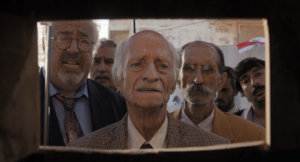QAIC’s Film Friday: “The President’s Visit”
Human nature has been a point of critique for centuries. With tendencies to love and wage war, the complexities of the human experience have inspired countless books, plays, and movies.
Absurdism is a genre that looks at the chaos and confusion of being human. By creating unrealistic or impossible situations, absurdist works often present ambiguous takes on the meaning (or lack thereof) of life.

Opening scene of “The President’s Visit”
In the short film “The President’s Visit,” Nino, a soapmaker uninspired by his repetitive lifestyle, learns that the President of Lebanon is to visit his soap store. Though a secret, Nino tells just his uncle — a man who happens to be the village gossiper. Before long, the entire village is preparing for the President’s visit; the streets are clean, pedestrians are casually wearing their very best, and Lebanese flags adorn every corner. Nino then sees his uncle appear on TV pretending to be the owner of the soap shop. With both trying to outdo the other, Nino and his uncle form a rivalry. Quarreling over who should distribute the soap, a fight breaks out between Nino, his uncle, and the local fisherman. The street returns to its natural state with garbage, decorations, and dirtied flags lining the street as the President arrives.
This film has earned awards from institutions in Qatar, the United States, Lebanon, and more. With such an expert take on absurdism, it is truly no surprise. In absurdist art, you can find meaning in almost every corner. Oftentimes, these meanings are not intended by the director but rather call on the audience to find their own moral of the story. In the case of “The President’s Visit,” the director Cyril Aris was intentional about the underlying meaning.

Fisherman outside Nino’s shop asking for soap
While the movie is, at surface level, an unlikely story of a soap-crazy village, it is has a multitude of fabulistic lessons; the conflict between the villagers and Nino shows the effect of vanity on human motivation, humans are driven by ego no matter the cost, and power will almost always show the worst side of people. It is easy to judge the characters for their unruly behavior or lack of grit, but, perhaps secretly, viewers sympathize with them.
According to the director’s website, this film is “rooted in real life: there are plenty of examples of a lack of critical thought in yesterday’s history or today’s news, which makes the film’s wry humor both a consolation and despair.” Under the guise of an absurdist comedy, lessons are taught about human desires and weaknesses. This movie offers not only an insight into mankind but also ourselves.

To watch the movie, click here.
To read more about the movie, click here.
This post was written by QAIC intern Alisa Grishin. Alisa is a senior at Salem State University in Salem, Massachusetts. She is currently pursuing a BA in History with a concentration in Public History, as well as minors in Legal Studies and Political Science.

